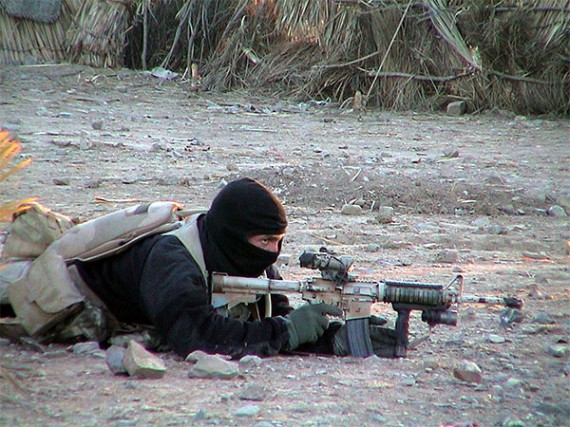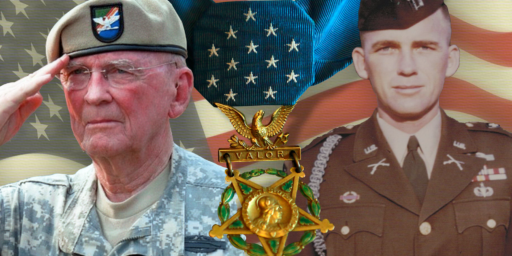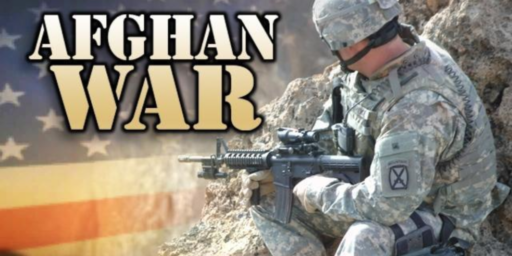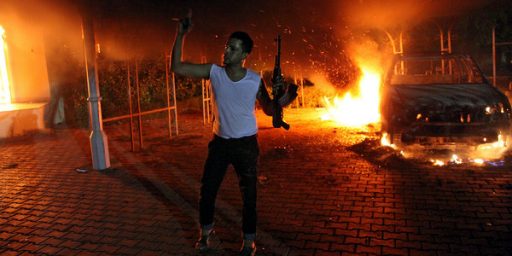Honor Fallen SEALs by Questioning Their Mission
Honoring the fallen by ensuring that the didn't die in vain is a recipe for getting more good men killed.
Joshua Foust tweets that his PBS piece “Lessons from this weekend’s Afghan helicopter crash” has been called “enemy propaganda” by some critics. That charge fundamentally misunderstands patriotism. He’s not divulging troop locations or battle plans; he’s questioning to what end our best warriors are being sacrificed.
But what were top-tier special operators doing in Wardak province, a restive area not really known for its central place in the insurgency? The latest reporting indicates that these elite soldiers were on a rescue mission to assist some U.S. Army Rangers who were pinned down by insurgent fire. In short, one elite group of troops had rushed to rescue another elite group of soldiers who’d been pinned down.
There has been quite a bit of discussion in military circles in recent years that our special operators are becoming “door kickers” rather than doing their primary training and covert action missions. As talented as Rangers are, Special Forces and SEAL troopers are a far more precious asset in terms of train-up time.
That said, I’ve been arguing for years that one of our greatest mistakes in both Iraq and Afghanistan was an overuse of drones and other “safe” tools and too little use of commandos. While I’m a huge fan of the Offset Strategy, which in the terminology of my old grad school buddy Wayne Maynard (a retired Green Beret and Ranger officer) trades “blood for gold” by investing in enormously expensive tools. But, while that’s great in a conventional battle like that envisioned between NATO and Warsaw Pact forces, it can be detrimental in a counterinsurgency or stabilization operation. As we saw in Kosovo and again in Iraq, Afghanistan, and Pakistan, engaging enemy targets from the relative safety of the sky means more civilian casualties. Aside from moral considerations, that can undermine the mission. If SEALs have to put play Ranger to more effectively achieve our strategic objectives, I can live with that.
That caveat aside, Josh’s larger point here isn’t so much that the SEALs who died over the weekend were doing non-SEAL work but that they were being risked for an ancillary fight in Wardak province, which doesn’t much matter in the grand scheme of the fight. His even larger point:
The real scandal in Afghanistan isn’t that Americans are getting killed. The real scandal is that we don’t know why we’re there. President Obama’s goal of disrupting, dismantling and defeating Al Qaeda has been largely accomplished. The Afghan government has a sufficiently large enough military to prevent a total Taliban takeover, and with a political reconciliation there is every likelihood that Al Qaeda will be denied access to Afghanistan.
Tragic as the loss of those soldiers is, without a clear strategy articulated by our leadership, it’s difficult to say what grander purpose they served. Rescuing other troops is a noble mission, and those that died in service to this mission all deserve our profound thanks. But if the war they’re fighting has no purpose and no definable end state, we should be questioning why they have to perform such heroic acts in the first place.
We should — we must — mourn the dead. But after we mourn, we should also ask why they’re being asked to sacrifice so much for a war that’s being propelled solely by inertia. The war is as incomprehensible post-crash as it was pre-crash. Despite our grief at this loss, our questions about why we’re there remain the same.
It’s an age-old cliche that we should honor the fallen by ensuring that the didn’t die in vain. To the extent that this motivates their comrades, it’s a great part of the warrior code. But if the fight is unwinnable–or has been as close to won as we’re likely to get for years–it’s also a recipe for getting more good men killed.







While the phrase has long been associated with our military fate in Vietnam in the 70s, the idea of declaring a victory and going home has a certain allure to it.
I had hoped we had learned this lesson in Vietnam but I guess not enough people are alive to remember it. The best way to support the troops is to keep them or get them out of senseless wars.
“The latest reporting indicates that these elite soldiers were on a rescue mission to assist some U.S. Army Rangers who were pinned down by insurgent fire.”
My first reaction when I read the news accounts was, “What the hell are SEALs doing acting as a reserve force in a groundpounder firefight?”
What Boyd said.
@sam: High-value extraction is a core DEVGRU mission, actually. It seems perfectly appropriate.
Had the honor of learning first hand about helicopter borne rescue in ’66. My first reaction on hearing the news was that (a) there must have been very inadequate air cover (the A1 ‘sandy’ was the only aircraft I ever wanted to kiss); and (b) what the hell were those guy doing in a Chinook. AFAIK those were never armored. The successor to my ‘Jolly Greens’ is the ‘Pave Low’ and just goggling a bit (I don’t keep up with these things as a routine, thank you Jesus) I see that the H53 has about 80kph speed advantage over the ’47.
Conclusion I came to was that this was likely a cobbled together operation thrown together with pieces and parts that didn’t fit and rushed into the boonies without adequate support or preparation. There should be some pretty high ranking people kissing their careers goodbye today.
Greetings:
Amid the outburst of breast-beating that has followed the demise of so many who would protect us, I can’t help but think about the nine blind guys and the elephant. It seems to me that very few are interested in figuring out the whole as opposed to the limited part to which one feels attached.
Among the many things my favorite Platoon Sergeant taught me was “Some days you eat the bulldog; some days the bulldog eats you.” However startling this incident is to us, things like this happen in war. Somedays, for some reason or other, you get out-soldiered and pay the price. I’m sure there will be plenty of After Action analyses forthcoming and maybe they will provide some foresight in the future. But, I’m becoming a bit unsettled by all this bathos of hindsight.
One of the things that bothers me is all these genuflections before the SEALs and SEAL Team 6. Granted they are brave warriors and prized military assets, but nobody gets a round-trip ticket when he goes off to war. This stratification of our combat forces is also disturbing to me. I once had a sociology professor who thought that some people liked the military because they liked its hierarchical structure, they knew where they stood. The argument that SEALs shouldn’t be supporting Rangers or god forbid, I guess, some straight-leg rifleman is sophomoric to my mind. I seem to remember being sent, as a Ist Cav leg rifleman, to help some Green Berets and their fellow travelers, get out of some deep doo-doo. If the warrior uses what is at hand, so must the planner.
As for the “What’s the strategy?” issue, this reminds me much of the left’s standard manipulation “Just let me fix the world, and then we’ll get to work on your problem.” The strategy, the tactic, the Plan of the Day, is kill some bad guys; as many as you can, as often as you can, any where and any way you can. No matter how many layers of sophisticated “strategy” our politicians and generals slather on that’s what it’s all about, now and forever.
Lastly, in a kind of damning with faint praise kind of way, the process of hollowing out our military continues. End the military draft for men, accept higher and higher percentages of women, make the military safe for homosexual conduct, no collateral damage, rules of engagement, real-time video supervision of operations, let’s discuss whether I can/should shoot somebody/something. Oh, and by the way, your highly reproductive by not so productive fellow citizens need a big piece of your budget to feather their social safety nets/hammocks. Now let’s go to work.
How, exactly, does accepting higher percentages of women into the military and making the military “safe for homosexual conduct” contribute to the hollowing out of the military?
Ahh, so the military is being decimated to feed welfare queens and their many children…
It costs $1 million to send a single soldier overseas for a year.
A drone costs around $5 million.
I just thought this list of developments that have allegedly contributed to “hollowing out the military” deserved highlighting. The fact that someone would post this in apparent earnestness would seem a great argument for the necessity of rules of engagement, and real time video supervision of combat operations wherever possible. At least, if we give a damn about human life and want to actually have a chance of waging a successful counterinsurgency operation.
I’m sure you’ll correct me if I’m wrong, but I don’t remember being called a patriot when I was questioning the wisdom of putting 160,000 US troops in the middle of Iraq’s sectarian conflict. The only reason why anyone is questioning the wisdom of having U.S. troops in Afghanistan right now is because George W. Bush isn’t the President. If that’s not “sunshine patriotism” I don’t know what is.
@Warren Jason Street: Since quite literally the first days of this blog, in January 2003, I was pushing back against the argument that opposition to the war in Iraq was unpatriotic. And I came to the conclusion that there was no reason to remain in Afghanistan long before Obama was elected.
“The only reason why anyone is questioning the wisdom of having U.S. troops in Afghanistan right now is because George W. Bush isn’t the President.”
??????????????
General Allen, Allied commander in Afghanistan, said this morning that the SEALs were not sent to rescue the Rangers, who were not even in contact when the CH-47 flew in. In fact, he said, the enemy had broken contact and was fleeing. The SEALs were called into cut them off and capture hi-value Taliban among them. Allen said that the SEALs were built into the mission from the outset and the task they were called on to do was what the operation actually planned for them to do.
In other words, the Rangers did what Rangers do best – kick the enemy’s butt so bad he runs away. And so the SEALs went in to pursue and capture. But remember that “the enemy gets a vote,” and, as we should keep reading Clausewitz, adapts to our operational methods. And so it seems they did.